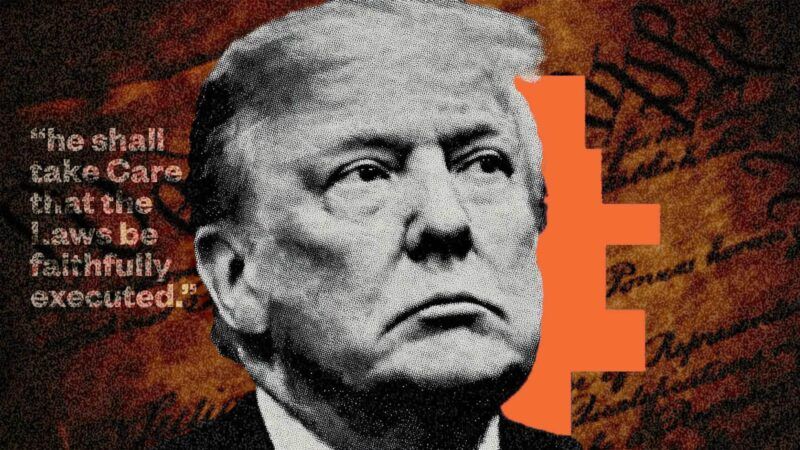Trump Won't Enforce the TikTok Ban. Is That Constitutional?
The Constitution requires the president to “take Care that the Laws be faithfully executed.”

The U.S. Constitution requires the president to "take Care that the Laws be faithfully executed." Yet President Donald Trump has not only refused to enforce the federal law banning TikTok, but his administration has also told multiple tech companies that they may openly violate the TikTok ban "without incurring any legal liability" because the Department of Justice is "irrevocably relinquishing any claims" against the companies "for the conduct proscribed in the Act."
But wait, may the president do that? May Trump encourage private parties to violate a duly enacted federal law while simultaneously vowing to free them from present and future liability for their lawbreaking? Is that constitutional?
You’re reading Injustice System from Damon Root and Reason. Get more of Damon’s commentary on constitutional law and American history.
American presidents have certainly disagreed over the years with some of the laws that they were charged with enforcing. And some presidents have even flat-out declined to enforce what they found disagreeable. Thomas Jefferson, for example, viewed the Sedition Act of 1798 as wholly unconstitutional and therefore refused to effectuate it when he became president in 1800.
As justification, Jefferson pointed to his presidential oath of office. To enforce an unconstitutional law, Jefferson maintained, would require him to violate his sworn oath to "preserve, protect, and defend the Constitution." The Sedition Act "was unconstitutional and null," Jefferson argued, and "my obligation to execute what was law, involved that of not suffering rights secured by valid laws, to be prostrated by what was no law."
The Obama administration did something similar in 2011 when Attorney General Eric Holder announced that the Justice Department would stop defending the 1996 Defense of Marriage Act (DOMA) in federal court because, in its view, DOMA violated the constitutional rights of same-sex couples. "This is the rare case," Holder argued, "where the proper course is to forgo the defense of this statute."
So, the idea of a president refusing to give force to a federal law is not unprecedented and is not necessarily a violation of the Take Care Clause of the Constitution.
However, unlike Jefferson or Barack Obama, Trump has not objected to the TikTok ban on constitutional grounds. Rather, Trump's argument is that he possesses the independent authority to set aside the TikTok ban while he attempts to line up a new buyer for the Chinese-owned social media platform. And where, you may ask, does Trump locate that novel power? Where else? In the president's "unique constitutional responsibility for the national security of the United States, the conduct of foreign policy, and other vital executive functions."
In other words, Trump argues that executive power alone permits him to suspend the enforcement of a valid federal law. And that is a far more sweeping and aggressive view of presidential authority than what was previously advocated by Jefferson or Obama.
Also sweeping and aggressive is Trump's view—as spelled out by Attorney General Pam Bondi in a series of letters to tech companies recently made public thanks to the Freedom of Information Act—that the executive branch has the power to "irrevocably" relinquish "any claims the United States may have had" against those companies for their past or current violation of the TikTok ban.
To be sure, the president does have a kind of prosecutorial discretion when it comes to the enforcement of federal law. The president may focus greater executive branch resources on some crimes instead of others. And the president may tell the American people all about it, effectively sending a message that some forms of lawbreaking will be more or less tolerated for a time because they are not a current federal law enforcement priority.
But Trump is doing something different here. What Trump is doing here is, first, asserting a new kind of presidential control over a valid federal law; second, issuing a sort of blanket immunity to a favored group of lawbreakers; and third, purporting to tie the hands of future Justice Departments ("irrevocably relinquishing any claims") when it comes to future treatment of those favored lawbreakers. That combination of factors seems like a sure recipe for corruption, cronyism, and executive abuse.
Trump's various other recent assertions of unilateral executive power have received more attention than his non-enforcement of the TikTok ban. But this one is also worth worrying about.


Show Comments (73)